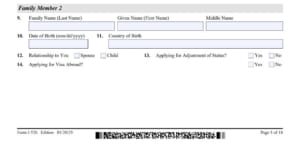On Saturday, August 22, the United States House of Representatives unanimously passed The Emergency Stopgap USCIS Stabilization Act (H.R. 8089). The legislation seeks to temporarily prevent planned furloughs by the United States Immigration and Citizenship Services (“USCIS”) by immediately increasing USCIS premium processing revenues.
In May 2020, USCIS notified Congress of a massive projected budget shortfall that was threatening the agency’s operations and the jobs of thousands of USCIS employees prompting it to request a $1.2 billion bailout from Congress to keep the agency operating. Without this funding, USCIS claimed that it would not have sufficient funds to maintain its operations through the end of the fiscal year or to fund its operations during the first quarter of fiscal year 2021 (October to December 2020).
Shortly thereafter, USCIS began issuing furlough notices to its employees and anticipated that it would need to begin furloughing approximately 13,400 employees starting August 3, 2020 if it did not receive funding from Congress. The furloughs that were initially set to begin on August 3, 2020, were postponed to August 30, 2020.
Furloughing 13,400 of the approximately 20,000 USCIS employees would significantly impact the processing of benefits provided by the USCIS offices and affect millions of people.
Many congresspersons from both parties have questioned the need for this additional emergency funding noting that the USCIS has substantial funding to continue operations through at least the end of November. On July 29, 2020, the House Judiciary Subcommittee on Immigration and Citizenship conducted a USCIS oversight hearing to review the USCIS proposed shortfall and which also led to a review of the agency’s ‘lack of efficiency in its operations.
If passed by the Senate and signed into law by the president, the bill would permit USCIS to use the additional premium processing funds for normal agency operations until further funding can be passed. Whether the bill will be passed is uncertain. The Senate is not scheduled to return to session until September and it is uncertain whether the bill will receive enough support to pass in the Senate and of course it will require to be signed into law by the anti-immigration President.
If you have concerns about the impact of the possible furloughs on your case, contact us at info@enterlinepartners.com and speak with a U.S. immigration attorney based in Ho Chi Minh City, Manila and Taipei.
ENTERLINE & PARTNERS CONSULTING
Ho Chi Minh City, Vietnam Office
Suite 601, 6th Floor, Saigon Tower
29 Le Duan Street
Ben Nghe Ward, District 1
Ho Chi Minh City, Vietnam
Tel: +84 933 301 488
Email: info@enterlinepartners.com
Facebook: Enterline & Partners – Dịch vụ Thị thực và Định cư Hoa Kỳ
Website: http://enterlinepartners.com
Manila, Philippines Office
Unit 2507 Cityland 10 Tower 1
156 H.V. Dela Costa Street
Makati City, Philippines 1209
Tel: +632 5310 1491
Email: info@enterlinepartners.com
Facebook: Enterline and Partners Philippines
Website: https://enterlinepartners.com/language/en/welcome/
Copyright 2020. This article is for information purposes only and does not constitute legal advice. This article may be changed with or without notice. The opinions expressed in this article are those of Enterline and Partners only.




